Navigating Songkran in Thailand: Thailand’s Songkran Festival, a vibrant celebration of the Thai New Year, takes place annually from April 13 to 15. This festive period is renowned for its energetic water fights and rich cultural traditions. If you’re planning to experience this unique event, here’s a comprehensive travel guide to help you navigate the festivities:
- What is Songkran?
- When and Where to Celebrate Songkran
- Travel Tips for Experiencing Songkran
- Safety Tips During Songkran
- What to Pack for Songkran
- Songkran Etiquette
- Cultural and Traditional Aspects
- Where to Stay During Songkran
- Food and Drinks to Try
- How to Get Around During Songkran
- Post-Songkran Relaxation
- Conclusion
- FAQs
What is Songkran?
Songkran, Thailand’s most beloved festival, is a time for cleansing and renewal. Traditionally, people poured water on Buddha statues and elders as a sign of respect and to wash away bad luck. Today, it’s a nationwide celebration filled with exciting water fights, vibrant street parties, and meaningful cultural rituals.
When and Where to Celebrate Songkran
Songkran officially runs from April 13th to 15th, but the festivities often start earlier and can last longer in certain places.
Where to Celebrate:
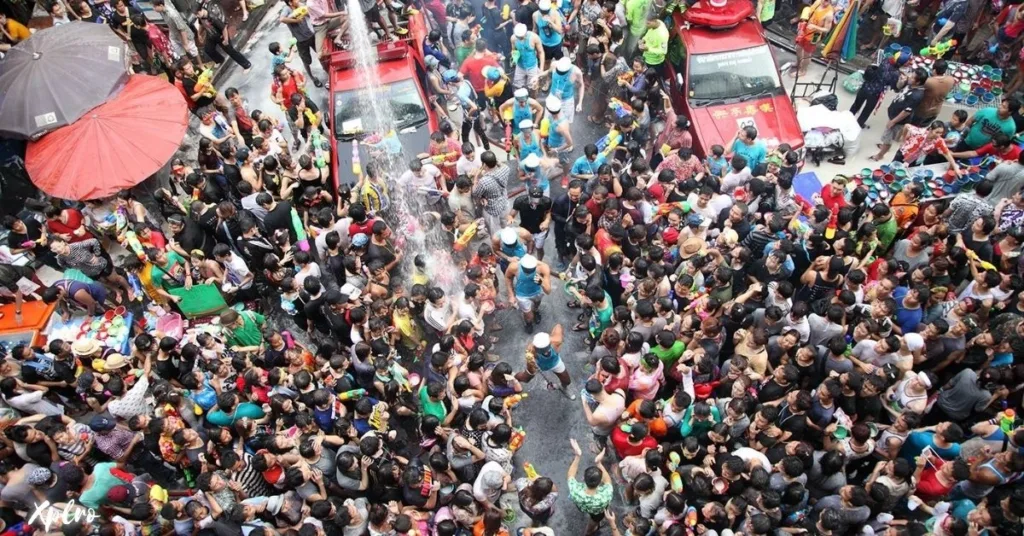
- Bangkok: Experience iconic water fights at Khao San Road and Silom Road.
- Chiang Mai: Join in the largest celebrations and traditional parades.
- Pattaya: Enjoy extended festivities, sometimes lasting a week.
- Phuket: Party on the vibrant streets near Patong Beach.
- Ayutthaya: Witness unique cultural experiences, including elephants participating in water fights.
Travel Tips for Experiencing Songkran
1. Dress Appropriately:
- Wear lightweight, quick-drying clothes like t-shirts and shorts.
- Avoid white clothing, as it can become see-through when wet.
- Opt for comfortable shoes or waterproof sandals.
2. Protect Your Belongings:
- Use a waterproof phone case or dry bag to keep your electronics, money, and ID safe.
- Bring only essential items to minimize the risk of loss or damage.
- Avoid carrying large amounts of cash.
3. Join the Fun: Navigating Songkran in Thailand
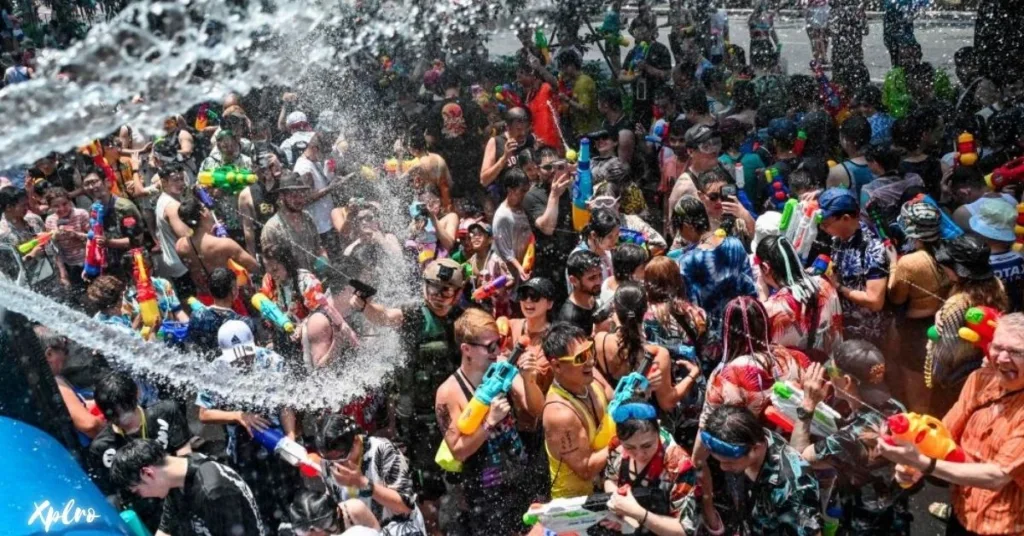
- Embrace the water fights – there’s no escaping them!
- Participate with a friendly and positive attitude; Songkran is all about fun and renewal.
Safety Tips During Songkran
1. Stay Safe in the Heat:
- Hydrate: Drink plenty of water to stay hydrated, especially in the hot Thai sun.
- Sun Protection: Apply sunscreen regularly to avoid sunburn.
2. Respectful Participation:
- Cultural Sensitivity: Remember to observe traditional aspects of Songkran, such as visiting temples respectfully.
- Water Etiquette: Avoid throwing water at monks, elders, or small children.
3. Road Safety:
- Public Transport: Opt for public transportation or taxis to avoid traffic congestion and accidents.
- Scooter Caution: If you’re using a scooter, be extra cautious, especially on roads with heavy water play.
What to Pack for Songkran
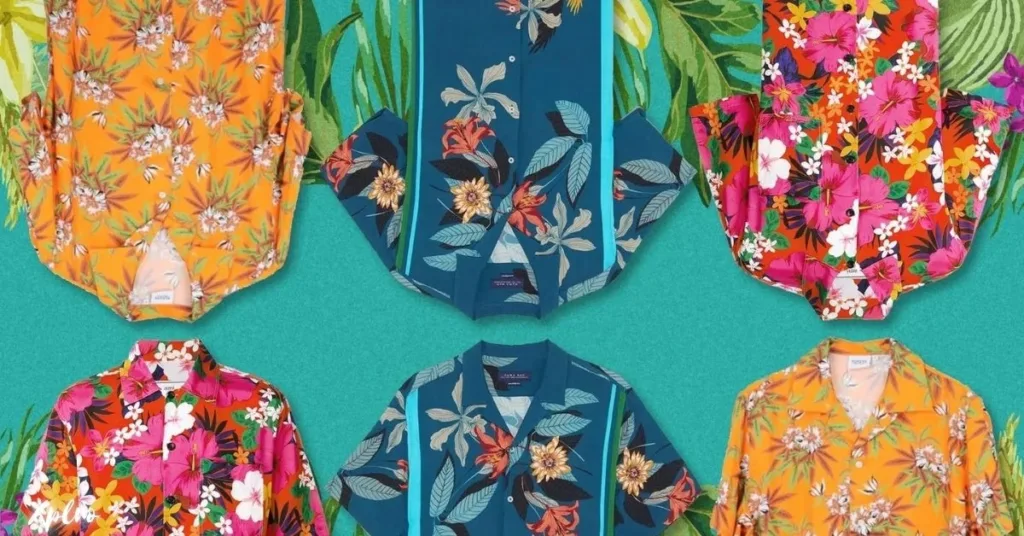
waterproof bags and cases, quick-drying clothes and sandals, extra clothes for temple visits, a refillable water gun (available at local markets), basic toiletries and a first-aid kit
Songkran Etiquette
- Mindful Water Fights: Avoid overly aggressive water fights or targeting those who clearly don’t want to participate.
- Seek Permission: Before splashing water on monks or elders, ask for their permission respectfully.
- Clean Water Only: Refrain from using dirty or icy water, as it’s considered disrespectful.
Cultural and Traditional Aspects
Beyond the water fights, Songkran offers a glimpse into Thai traditions:
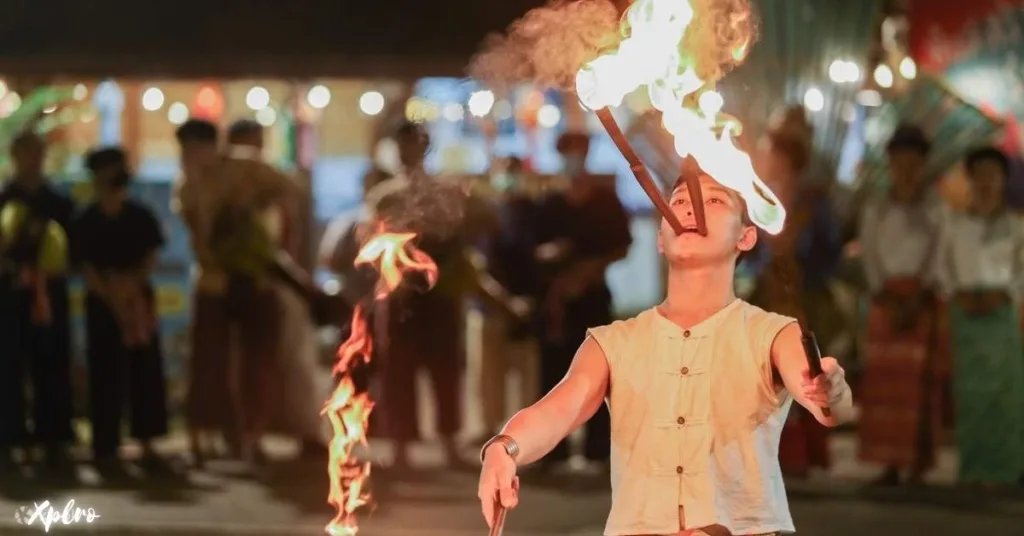
- Temple Visits: People visit temples to make merit, offer food to monks, and pour water on Buddha statues as a symbol of purification.
- Family Gatherings: Many Thais return home to spend quality time with family and honor their elders.
- Cultural Performances: Cities like Chiang Mai host vibrant parades and cultural shows.
Where to Stay During Songkran
- Book Early: Songkran is a popular festival, so book your accommodations well in advance, especially if you’re planning to stay in popular destinations like Bangkok or Chiang Mai.
- Choose Your Vibe: If you want to be in the heart of the action, choose a hotel or hostel near the main celebration areas. For a more relaxed experience, consider staying in quieter areas or outside the city center.
Food and Drinks to Try
Songkran is a great opportunity to indulge in delicious Thai street food:
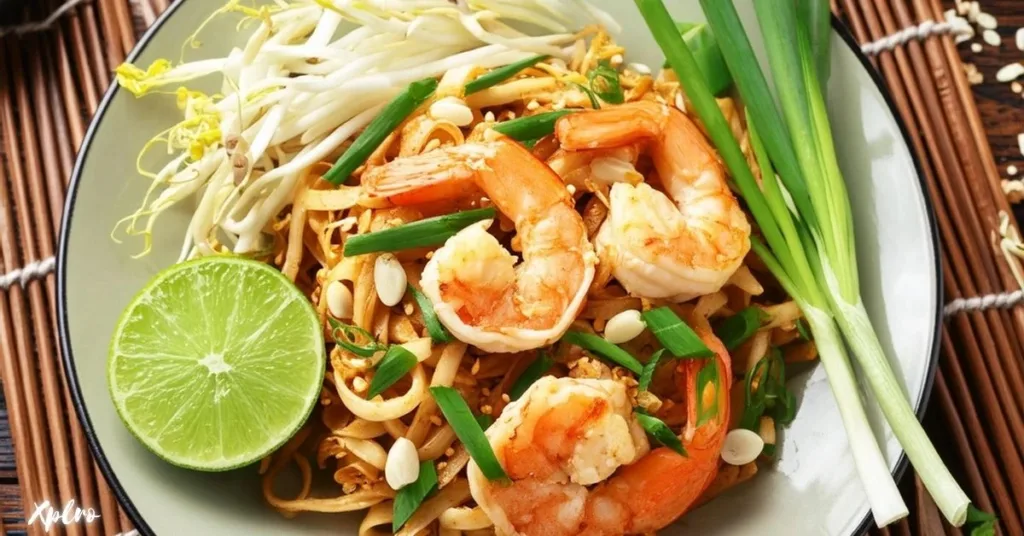
- Pad Thai: Savory stir-fried noodles with shrimp or chicken.
- Mango Sticky Rice: A sweet and refreshing dessert.
- Som Tam: A spicy and tangy green papaya salad.
- Coconut Water: A natural and hydrating drink to beat the heat.
How to Get Around During Songkran
Transportation Tips:
- Tuk-tuks and Songthaews: These are convenient for short distances, but be prepared to get wet!
- Public Buses: A budget-friendly option, but expect potential delays during the festivities.
- Ride-Sharing Apps: Use services like Grab for a drier and more comfortable ride.
Post-Songkran Relaxation
After the excitement of Songkran, take some time to relax and explore:
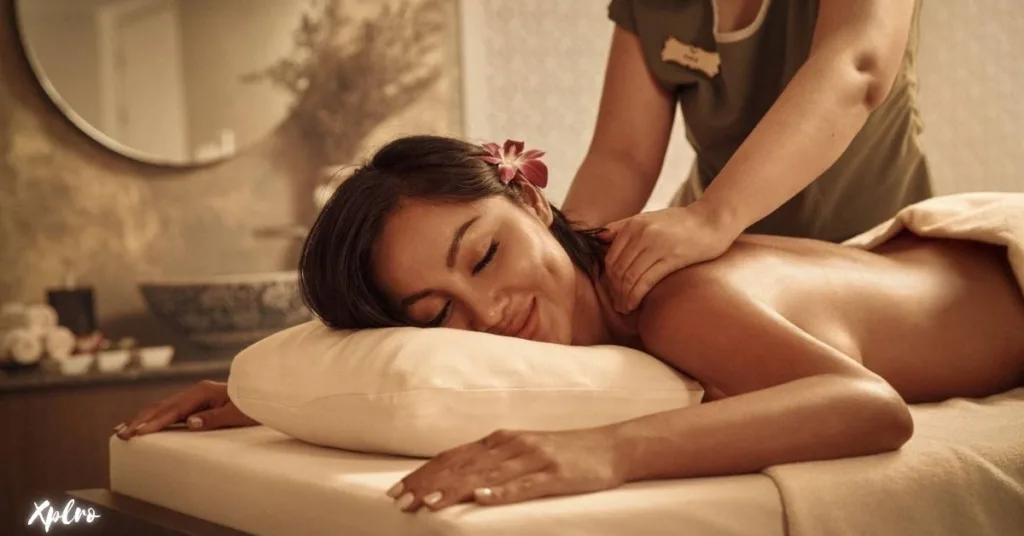
- Temple Hopping: Visit Thailand’s stunning temples and learn about its rich history and culture.
- Beach Retreat: Escape to the beautiful beaches of Phuket, Koh Samui, or Krabi.
- Thai Massage: Pamper yourself with a relaxing Thai massage.
Conclusion
Songkran, Thailand’s vibrant New Year festival celebrated from April 13th to 15th, is more than just a water fight! It’s a joyous time for cleansing, renewal, and national unity. Embrace the friendly water battles with quick-drying clothes, a waterproof bag, and a refillable water gun (easily found at local markets). Plan your trip around the festivities using weather apps and book accommodation well in advance with Xplro.com (your travel planning sidekick!) to navigate popular destinations like Bangkok or Chiang Mai. Witness cultural parades in Chiang Mai, iconic water fights on Khao San Road in Bangkok, or unique experiences with elephants participating in Ayutthaya.
Remember, respect is key! Avoid overly aggressive water fights, ask permission before splashing monks or elders, and use clean water. Beyond the playful chaos, delve into Thai traditions by visiting temples to make merit, offering food to monks, and witnessing cultural shows. Savor delicious street food like Pad Thai or Mango Sticky Rice while staying hydrated with refreshing coconut water. Navigate the wet streets with tuk-tuks or ride-sharing apps like Grab for a drier ride.
After the celebrations, unwind with a Thai massage, explore magnificent temples, or relax on the beaches of Phuket, Koh Samui, or Krabi. Songkran offers a chance to experience the true spirit of Thailand – embrace the fun, immerse yourself in the traditions, and create unforgettable memories with Xplro.com as your guide!
FAQs
1. What is the Songkran Festival?
- The Songkran Festival is Thailand’s traditional New Year celebration, taking place every year from April 13 to 15. It marks the start of the Thai solar calendar and is known for its lively water fights, which symbolize washing away the old year’s misfortunes to welcome renewal and good luck. Beyond the playful water activities, it also carries cultural and spiritual significance, including temple visits and paying respect to elders.
2. Why is water so important during Songkran?
- Water plays a central role in Songkran because it symbolizes purification, cleansing, and renewal. In the past, people gently poured water over Buddha statues and elders as a way to show respect and wash away negativity. Over time, this evolved into the more playful aspect of the festival, with water fights becoming a way to beat the heat and share joy during the festivities.
3. Where are the best places to experience Songkran in Thailand?
- Songkran is celebrated across Thailand, but some places stand out for their unique festivities. In Bangkok, Khao San Road and Silom Road are the heart of the water fights. Chiang Mai offers a mix of cultural parades and large-scale celebrations that attract both locals and tourists. Phuket’s Patong Beach becomes a hub for vibrant parties, while Ayutthaya blends traditional water celebrations with historical charm.
4. How can travelers prepare for Songkran?
- Travelers should come prepared with lightweight, quick-drying clothing and waterproof accessories like phone cases or dry bags for valuables. A refillable water gun is a must-have for joining in the festivities, and sunscreen, sunglasses, and a hat can help combat the heat. Packing an extra set of clothes is a good idea, as getting drenched is almost unavoidable.
5. Is Songkran safe for tourists to participate in?
- Songkran is generally safe for tourists as long as they follow basic precautions. The atmosphere is friendly and welcoming, but staying hydrated and protecting yourself from the sun is crucial. Travelers should also watch out for slippery surfaces and avoid crowded areas if they feel overwhelmed. Safety increases when visitors respect local customs and stay mindful of their surroundings.
6. Should accommodations be booked in advance for Songkran?
- Yes, booking accommodations ahead of time is highly recommended during Songkran. The festival attracts a significant number of tourists, and popular cities like Bangkok and Chiang Mai see a surge in visitors. Reserving your stay a few weeks in advance ensures that you have a comfortable base near the action or in a quieter area, depending on your preference.
7. What should people wear during Songkran?
- Dressing appropriately is key to enjoying the Songkran festival. Lightweight and breathable clothing, like t-shirts and shorts, is ideal. Quick-drying materials are helpful as you’ll be drenched throughout the day. Avoid wearing white clothes to prevent see-through situations, and opt for comfortable sandals or waterproof shoes to navigate wet streets with ease.
8. Are there rules for participating in Songkran water fights?
- There are a few unwritten rules to ensure everyone enjoys the festivities respectfully. Avoid throwing water at monks, elders, and small children. Using clean water is encouraged, as dirty or ice-cold water can cause discomfort. It’s also important to respect people who choose not to participate in the water fights, especially if they are carrying valuables or wearing formal attire.
9. Can tourists visit temples during Songkran?
- Yes, visiting temples during Songkran is a meaningful way to experience the festival’s cultural side. Tourists can participate in traditional activities like pouring water over Buddha statues, making merit, and offering alms to monks. It’s essential to dress modestly when visiting temples, covering shoulders and knees, and to observe the sanctity of the space.
10. What cultural traditions are observed during Songkran besides water fights?
- While the water fights grab most of the attention, Songkran also includes many traditional activities. Families reunite during this time, with younger members paying respect to elders by pouring water on their hands. At temples, people participate in merit-making ceremonies, candlelit processions, and the cleaning of Buddha images. In cities like Chiang Mai, cultural parades and traditional performances add to the festive atmosphere.
11. Are Songkran celebrations different across Thailand?
- Yes, the way Songkran is celebrated varies by region. In northern Thailand, especially in Chiang Mai, the focus is on cultural traditions, including parades and merit-making. In central Thailand, such as Bangkok, modern water fights dominate the scene, while in southern regions like Phuket, lively beach parties take center stage. Historical cities like Ayutthaya combine traditional activities with unique settings like water fights near ancient ruins.
12. What should travelers avoid during Songkran?
- During Songkran, travelers should avoid throwing water at people on motorcycles, as it can cause accidents. It’s best to refrain from carrying expensive items or large sums of cash, as they might get damaged or lost. Being mindful of alcohol consumption is important, especially if traveling on crowded roads, as accidents tend to increase during this time. Lastly, showing respect for local customs and traditions ensures a more enjoyable experience for everyone.






